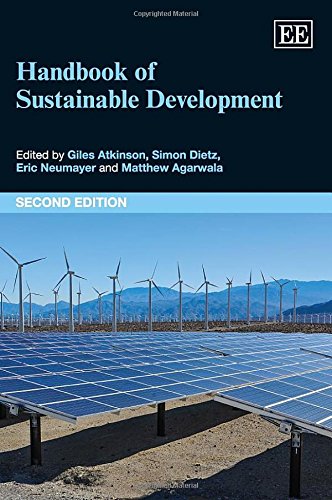

Most ebook files are in PDF format, so you can easily read them using various software such as Foxit Reader or directly on the Google Chrome browser.
Some ebook files are released by publishers in other formats such as .awz, .mobi, .epub, .fb2, etc. You may need to install specific software to read these formats on mobile/PC, such as Calibre.
Please read the tutorial at this link. https://ebooknice.com/page/post?id=faq
We offer FREE conversion to the popular formats you request; however, this may take some time. Therefore, right after payment, please email us, and we will try to provide the service as quickly as possible.
For some exceptional file formats or broken links (if any), please refrain from opening any disputes. Instead, email us first, and we will try to assist within a maximum of 6 hours.
EbookNice Team

Status:
Available0.0
0 reviews'There is now wide recognition that current patterns of economic development are already putting great strains on resources, environment and the climate and that, if continued, the consequences could undermine or reverse past development gains and, possibly, lead to catastrophe. In other words our current paths are unsustainable. This Handbook provides a very thorough, thoughtful and valuable contribution to our understanding of the possible meanings of sustainable development, how it can be understood and calibrated, and characteristics of and choices around alternative paths. This is a subject that should be at the centre of the study of development and encompasses many disciplines. And it should be a subject that commands the attention of all those who think carefully about our future well-being; they will find this Handbook fascinating and essential reading.'
- Lord Nicholas Stern, London School of Economics and Political Science, UK
This timely and important Handbook takes stock of progress made in our understanding of what sustainable development actually is and how it can be measured and achieved.
This fully updated and revised second edition captures recent developments in the field, including 14 new chapters by internationally renowned authors from a variety of perspectives and disciplines. The authors explain that the gap between public commitments to sustainable development and real-world action towards achieving it is still significant, but not insurmountable, and that opportunities do exist to reduce that margin. Contributors synthesize the established knowledge and clearly present cutting-edge concepts from the frontier of sustainability research with direct relevance to theory and practice. Topics covered include: the fundamentals of sustainability; equity within and between generations; the capital approach; green growth; measurements and indicators of sustainability; climate change and wellbeing.
This accessible, comprehensive and multidisciplinary approach to exploring the theory and practice of sustainable development will prove an invaluable reference tool for researchers, students, academics and practitioners with an interest in the field of sustainable development.
Contributors: W.N. Adger, S. Afionis, J. Agyeman, M. Agarwala, J.A. Allan, G.B. Asheim, G. Atkinson, R.M. Auty, E.B. Barbier, A. Bowen, C. Carraro, M.A. Cole, G. Cranston, S. Dietz, L. Dupuy, O. Edenhofer, P. Ekins, S. Fankhauser, T.J. Foxon, A. Galli, G. Gosnell, A. Gouldson, R. Green, K. Hamilton, G. Heal, C. Hepburn, J. Hodbod, T. Jackson, S. Kadner, B. Kristr m, G.-M. Lange, P. Lawn, A. Lucchesi, G. Luderer, J.A. McGregor, G. McNicoll, J.C. Morales, Y. Mulugetta, E. Naikal, E. Neumayer, B.G. Norton, D. Pearce, A. Randall, Y. Rydin, G. Schwerhoff, R. Sullivan, A. Thompson, C.A. Tisdell, J.C.J.M. van den Bergh, J. Vogler, C. von Stechow, M. Wackernagel, A. Winkels, G. Yohe, Z. Zhang